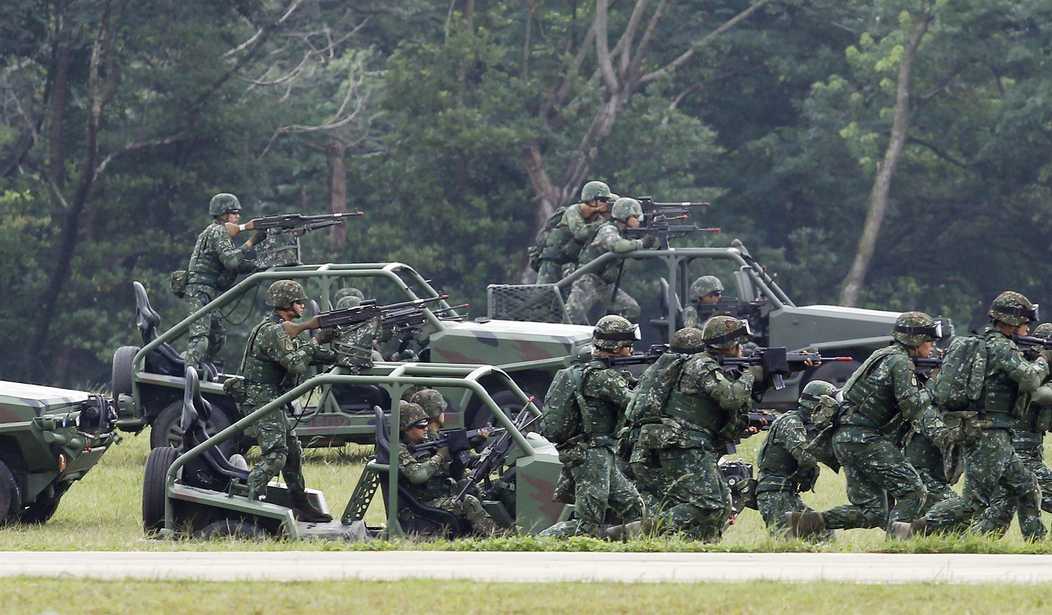Taiwan's presidential election was bitterly fought and ended up being closer than expected. But when the dust cleared, Lai Ching-te of Taiwan's Democratic Progressive Party (DPP) received a clear majority with about 40% of the votes cast.
Lai is the island nation's sitting vice president and is expected to continue his party's policy of resisting China's efforts to assimilate Taiwan. Beijing warned Taiwan ahead of the vote against electing Lai.
The AFP reported that "China warned Taiwan's voters Thursday to make the correct choice in the island's weekend elections, describing the presidential frontrunner as a 'severe danger' who would threaten peace by following the 'evil path' of independence."
As late as Saturday when millions of Taiwanese were voting,, an official Beijing news outlet warned that Lai could take Taiwan “on a path of no return.”
The Chinese Communists have been making threats like this during the entire one month campaign. Obvious, it had little effect on Taiwan's voters.
Addressing his supporters at the event, Mr. Lai called for unity, while also pledging his commitment to defending Taiwan’s identity. “Between democracy and authoritarianism, we choose to stand on the whip of democracy,” Mr. Lai said. “This is what this election campaign means to the world.”
The vote drew a strong voter turnout of 72 percent, including many who had flown home from abroad. In some polling stations, lines began forming even before voting started in the morning, with many multigenerational families showing up in groups. Taiwanese citizens, who must vote in person, fanned out to reach nearly 18,000 polling stations in temples, churches, community centers and schools across the island.
Taiwan has what appears to be a nearly foolproof electoral process. According to NPR, "For security reasons, Taiwan does not allow absentee voting, mandating that all voters cast their ballots in-person, on paper only. The physical ballots are then counted by hand at every polling station, a process that is completely open to the public."
As long as all interested parties have their eyes on the ballots from the time the votes are cast until they're counted, it would be very difficult to stuff the ballot boxes or add votes to the total.
"[Beijing] will use more economic coercion, diplomatic coercion, more informational warfare, and maybe more on the trade instead of using the military approach," said Fang-yu Chen, a political science at Soochow University in Taipei. "But that being said, we still have to get ready."
“Internally, there won’t be any honeymoon period for him,” said Jason Hsu, a former member of Taiwan’s legislature for the Nationalist Party who is now a Mason Fellow at Harvard Kennedy School. “Externally, he’s likely to face stronger pressure and aggression from China both militarily and economically.”
Lai's DPP Party fell far short of a parliamentary majority while the opposition Kuomintang Party (KMT) won 52 out of 113 seats. Along with a third party in the race, the Taiwan People's Party (TWP) which won 10 seats, the KMT will have to unite with the TWP to form a shaky coalition.
Mr. Lai is not the reckless firebrand that Beijing has depicted, say Taiwanese politicians who know him; nor is war over Taiwan imminent or inevitable, say many officials and experts. Mr. Lai campaigned on a theme of continuity with the policies of Ms. Tsai, who has sought to build up Taiwan’s military defenses and deepen relations with the United States and other democracies while avoiding a total rupture with China.
But even if Mr. Lai sticks faithfully to that course, he may face a searing test of his political and diplomatic skills to keep Taiwan secure and united against deepening pressure from China. Mr. Lai will be Taiwan’s president during a time when, some U.S. officials have warned, China will be increasingly ready to try to seize or subdue Taiwan, which it sees as its lost territory, by armed force.
Lai will be walking on eggshells when it comes to dealing with the mainland. But what Lai says about Beijing is far less important than what he does. Building up Taiwan's arsenal, improving on an already productive relationship with the U.S., and expanding relationships with Australia, New Zealand, and other Pacific democracies would be far more provocative to China than sloganeering about independence.










